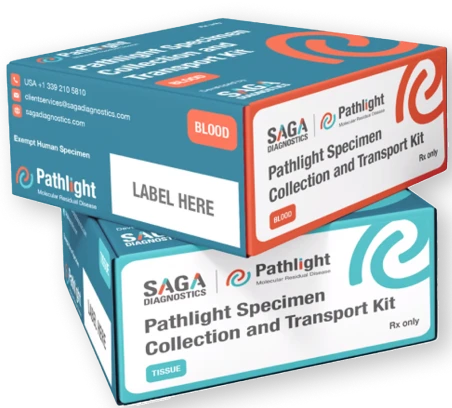Covered by Medicare for select indications. Learn more.
A guiding light in early cancer detection
The next generation of molecular residual disease detection and cancer monitoring.
What is Molecular Residual Disease (MRD) testing?
MRD testing is a cancer surveillance (cancer monitoring) method that uses routine blood draws to detect tiny fragments of tumor-specific DNA.
Many tumors shed tiny fragments of DNA into the bloodstream. This circulating tumor DNA (ctDNA) is unique to each person’s tumor, similar to a fingerprint. Pathlight is a first-of-its-kind, multi-cancer MRD test based on your tumor’s unique molecular fingerprint. The test can be conducted many times over the course of your care to track how your cancer is responding to treatments, allowing for continuous cancer surveillance.

Why is cancer surveillance important?
Cancer surveillance is important because it can offer you and your clinician insight into whether your cancer has recurred and whether your treatment is working before you have symptoms, or before it can be detected by standard-of-care imaging.
Cancer surveillance helps your doctor answer important questions about your cancer that inform your care. The results from an MRD test can help your doctor decide how best to treat your cancer, whether a treatment is working effectively, or whether there are still trace amounts of cancer in your body after treatment. Pathlight is ultra sensitive, so it can detect small amounts of cancer much earlier than other surveillance methods, including imaging tools like computerized tomography (CT) scan, magnetic resonance imaging (MRI), positron emission tomography (PET) scan, and mammography.

How is MRD testing performed?
MRD testing involves the initial development of a personalized molecular fingerprint using a tissue biopsy sample, and thereafter periodic blood draws for cancer monitoring.

Personalized test development
After diagnosis, a sample of your tumor tissue is used to develop your personalized MRD test, based on your tumor’s “fingerprint” – genetic characteristics that make your tumor cells unique from your healthy cells.

Routine blood testing
After a routine blood draw, your sample will be checked for your tumor’s ctDNA using your personalized MRD test.

Results
Pathlight may detect the presence or absence of ctDNA each time it is ordered.
How long will my results take?
3 - 4 weeks
to develop your personalized tumor fingerprint test and initial MRD blood test following receipt of both tissue and blood at the laboratory
3 - 5 days
to receive the results of your blood test following receipt of blood at the laboratory

Test Results
Your test results track whether your cancer has recurred and can provide insights into how your cancer is responding to treatment over time.

- ctDNA detected
DNA from your tumor was detected in your blood, meaning some amount of cancer is still presentctDNA - ctDNA not detected
There is no evidence for residual cancer at this time
- Amount of ctDNA is increasing over time
This may be an early indication that your cancer is recurring, or resisting treatment† - Amount of ctDNA is decreasing over time
If your tests are positive, but the amount of ctDNA detected in your blood is decreasing over time, it may indicate your cancer is responding to treatment†
† for informational purposes only
How accurate is Pathlight?
Pathlight uses a new “molecular fingerprinting” method that can detect the absence or presence of ctDNA in blood. This means that you can be confident in your results.1
Click below for answers to other frequently asked questions.
We believe financial constraints should never be a barrier to the care you need.
Our Pathlight Patient Support Program is designed to support uninsured and underinsured financially eligible patients.
Support May Include
- Full or partial financial assistance based on household income and financial hardship
- Help with insurance appeals for denied claims
- Interest-free payment plans for eligible balances.
How to Apply
Complete the brief form, including household income details, and upload supporting documentation.
A member of our support team will review and respond to your application and contact you within 5–7 business days.
For any questions, call our Billing team at 1-855-767-1009 or email us at patientservices@sagadiagnostics.com.
References
- Elliott MJ, Howarth K, Main S, et al. Ultrasensitive detection and monitoring of circulating tumor DNA using structural variants in early-stage breast cancer. Clin Cancer Res. Published online January 7, 2025. doi:10.1158/1078-0432.CCR-24-3472